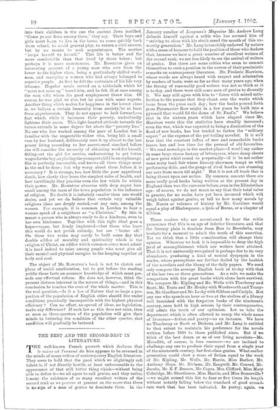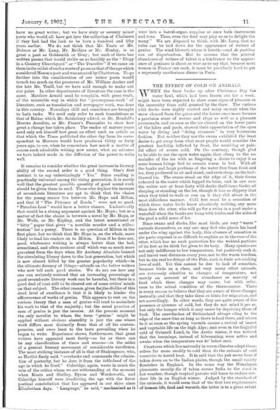T•HE BEST AND THE SECOND-BEST IN LITERATURE.
THE well-known French proverb which declares that le mieux est l'ennemi du bier appears to be reversed in the minds of many critics of contemporary English literature. They seem to hold that the good which we slightingly call talent is, if not directly hostile. at least unfavourable to the appearance of that still better thing which—without being able to define it—we all agree to call genius, and they rather lament the existence of so many excellent writers of the second rank as we possess at present on the score that there is no sign of a man of genius to dominate them. In the January number of Longman's Magazine Mr. Andrew Lang defends himself against a critic who has accused him of "striving to close with his strait creed the mouth of thisnn- worthy generation." Mr. Lang is too richly endowed by nature with a sense of humour to hold the position of those who declare that, because we have a great number of excellent writers of, the second rank, we are less likely to see the arrival of writers of genius. But there are some critics who seem to commit themselves to such a position in the course of their pessimistic remarks on contemporary literature. Mr. Frederic Harrison, whose words are always heard with respect and admiration by readers of taste, went as far as that many years ago, when the throng of reasonably good writers was not so thick as it is to-day, and there were still some men of genius to diversify it. We may still agree with him to " listen with mixed satis- faction to the paeans that they chant over the works which issue from the press each day; how the books poured forth from Paternoster Row might in a few years be built into a pyramid that would fill the dome of St. Paul's." We believe that in the sixteen years which have elapsed since Mr. Harrison wrote this the statistic's have steadily increased; even the war, which was expected to bring a diminution of the flood of new books, has but tended to fatten the " military expert" at the expense of the pot-boiling novelist. It is still true that the constant influx of new and remarkable books leaves less and less time for the perusal of old favourites. " We read nowadays in the market-place—I would say rather in some large steam factory of-letterpress, where damp sheets of new print whirl round us perpetually—if it be not rather some noisy book fair where literary showmen tempt us with performing dolls, and the gongs of rival booths are stunning our ears from morn till night." But it is not all trash that is being thrust upon our notice. By common consent there are more really good books being written at the present day in England than was the caee ever before, even in the Elizabethan age : of course, we do not mean to say that their total value is greater, for no scales have yet been invented which will weigh talent against genius, or tell us how many novels by Mr. Norris or volumes of history by Mr. Gardiner would equal a play of Shakespeare, a lyric of Burns, or a chapter of Gibbon.
Those readers who are accustomed to hear the critic pronounce that this is an age of inferior literature, and that the literary plain is desolate from Dan to Beersheba, may hesitate for a moment to admit the truth of this assertion. Yet we think that a little consideration will change their opinion. Wherever we look it is impossible to deny the high level of accomplishment which our writers have attained. That it is not -universally recognised is perhaps due to its very abundance, producing a kind of mental dyspepsia in the reader, whose perceptions are further dulled by the hashish of the novelists and the bhang of the daily papers. We need only compare the average English book of to-day with that of the last two or three generations. As a rule, we make the comparison with the great books which alone have survived. We compare Mr. Kipling and Mr. Wells with Thackeray and Scott, Dir. Yeats and Mr. Henley with Wordsworth and Tenny- son, Mr. Gardiner and Mr. Lecky with Gibbon and Carlyle. But any one who spends an hour or two at the shelves of a library well furnished with the forgotten books of the nineteenth century, once held in high esteem by their contemporaries, will admit the truth of our optimism. Let us take the department which is often allowed to usurp the whole name of literature—fiction and poetry—as an instance. We have no Thackeray or Scott or Dickens, and Mr. Lang is entitled to that extent to maintain his preference for the novels written before 1860 to those published since. But if we think of the best dozen or so of our living novelists—Mr. Meredith, of course, is hors contours—we are inclined to challenge any one to produce their equal from a single year of the nineteenth century, bar first-class genius. What earlier generation could show a mass of fiction equal to the work of Mr. Kipling, Mr. Wells, Mr. Barrie, Miss Barlow, Mr. Anthony Hope, Mr. Hichens, Mr. Zangwill, Mr. Conrad, Mr. Jacobs, Mr. E. F. Benson, Mr. Capes, Mrs. Clifford, Miss Mary Coleridge, Mr. Shorthouse, Miss Martin, and Miss Somerville ? —we might extend this list to four or five times its length without notably falling below the standard of good second- rate work that has been indicated. In poetry, again, we
have no great writer; but we have sixty or seventy minor poets who would all have got into the collection of Chalmers if they had had the luck to be born a hundred and fifty years earlier. We do not think that Mr. Yeats or Mr. Dobson or Mr. Lang, Mr. Bridges or Mr. Henley, is as great a poet as Goldsmith or Gray ; but each of them has written poems that would strike us as forcibly as the " Elegy in a Country Churchyard" or " The Traveller " if we came on them in the midst of such a waste of prose as that of the age which considered Mason a poet and was amazed by Chatterton. To go further into the consideration of our minor poets would trench too much on the preserves of Mr. William Archer and the late Mr. Trail, but we have said enough to make out our point. In other departments of literature the case is the same. Matthew Arnold used to complain, with great truth, of the miserable way in which the " journeyman-work " of literature, such as translation and newspaper work, was done in this country. Nowadays skill and conscience are brought to both tasks. We need only refer to such translations as that of Balzac which Mr. Saintsbury edited, or Dr. Rendall's Marcus Aurelius, or Mr. Frazer's Pausanias to show how great a change has taken place. The reader of mature years need.only ask himself how great an effect such an article as that which the Times published the other day from its corre- spondent in Morocco would have produced thirty or forty years ago, to see, when he remembers how much a matter of course such admirable writing now seems, what an advance we have indeed made in the diffusion of the power to write well.
It remains to consider whether the great increase in literary ability of the second order is a good thing. One's first instinct is to say unhesitatingly " Yes." Since reading is practically universal among the rising generation, it is surely well that the greatest possible quantity of good sound work should be given them to read. Those who deplore the increase of second-rate literature are apt to think that the choice for the young reader lies between Mr. Hope and Milton, and that if " The Prisoner of Zenda " were not so good, "Paradise Lost" would have a better chance. Undoubtedly that would be a strong argument against Mr. Hope; but as a matter of fact the choice is between a novel by Mr. Hope, or Mr. Wells, or Mr. Kipling, and the latest sensational or " bitty " paper that gives " a norrible murder and a nillus- tration " for a penny. There is no question of Milton in the first place, but we think that Mr. Hope is, on the whole, more likely to lead his readers on to Milton. Even if he does not, good, wholesome writing is always better than the bad, sensational, and often noxious stuff which was so much more prevalent from the days when Sir Anthony Absolute banned the circulating library down to the last generation, but which is now almost killed by the greater popularity which—in the ultimate decency of things—attends on the better writers who now tell such good stories. We do not see how any one can seriously contend that an increasing percentage of good second-rate literary work can be harmful, but there is a good deal of cant still to be cleared out of some critics' minds on that subject. The other reason given forthe dislike of this dead level of excellence is that it is likely to hinder the efflorescence of works of genius. This appears to rest on the curious theory that a man of genius will tend to assimilate his work to that of the majority; but the usual practice of men of genius is just the reverse. At the present moment the only novelist to whom the term " genius " might be applied without obvious absurdity is just the one whose work differs most distinctly from that of all his contem- poraries, and owes least to the taste prevailing when he began to write. Experience shows, furthermore, that great writers have appeared most freely—so far as there can be any classification of times and seasons—in the midst of a general literary movement of considerable excellence. The most striking instance of all is that of Shakespeare, who, as Hazlitt finely said, " overlooks and commands the admira- tion of posterity, but he does it from the table-land of the age in which he lived." Coleridge, again, wrote in much the vein of the critics whom we are withstanding at the moment when Keats and Shelley, Byron and Wordsworth, and Coleridge himself were irradiating the age with the finest poetical constellation that has appeared in our skies since Elizabethan days. " Language," he said, " mechanised as it
were into a barrel-organ, supplies at once both instrument and tune. Thus, even the deaf may play so as to delight the many." We are disposed to think, with Mr. Lang, that no rules can be laid down for the appearance of writers of genius. The wind bloweth where it listeth,—and de gustibue non eat disputandum. But to assume that the general abundance of writers of talent is a hindrance to the appear- ance of geniuses is about as wise as to say that, because most women in France can cook, it must be peculiarly hard to get a supremely meritorious dinner in Paris.







































 Previous page
Previous page